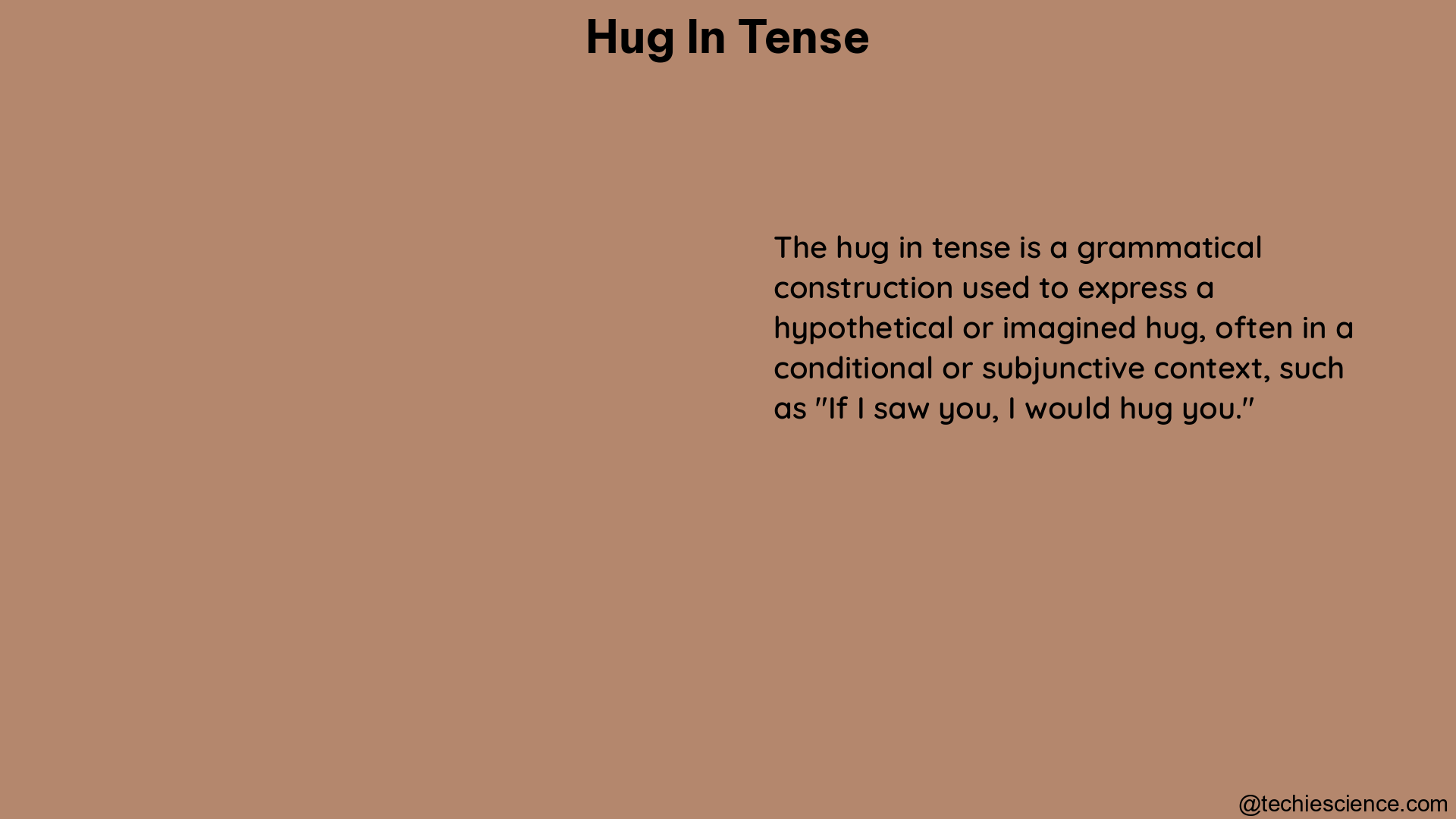The verb “hug” in English grammar follows a regular conjugation pattern across various tenses, providing a structured framework for expressing the act of embracing someone or something. This comprehensive guide delves into the intricate details of using “hug” in different tense forms, equipping you with the knowledge to communicate effectively and accurately in a wide range of contexts.
Present Tense
In the present tense, the verb “hug” takes on the following forms:
Singular:
– I hug
– You hug
– He/She/It hugs
Plural:
– We hug
– You hug
– They hug
Examples:
– I hug my loved ones every day.
– She hugs her children before bedtime.
– They hug each other in celebration.
Present Progressive Tense

The present progressive tense, also known as the present continuous tense, describes an ongoing action in the present. The conjugation of “hug” in this tense is as follows:
Singular:
– I am hugging
– You are hugging
– He/She/It is hugging
Plural:
– We are hugging
– You are hugging
– They are hugging
Examples:
– I am hugging my friend right now.
– She is hugging her pet dog affectionately.
– They are hugging each other goodbye before the trip.
Past Tense
In the past tense, the verb “hug” takes on the following forms:
Singular:
– I hugged
– You hugged
– He/She/It hugged
Plural:
– We hugged
– You hugged
– They hugged
Examples:
– I hugged my grandmother when I saw her.
– She hugged her son after his graduation ceremony.
– They hugged each other in celebration of their team’s victory.
Past Progressive Tense
The past progressive tense, also known as the past continuous tense, describes an ongoing action in the past. The conjugation of “hug” in this tense is as follows:
Singular:
– I was hugging
– You were hugging
– He/She/It was hugging
Plural:
– We were hugging
– You were hugging
– They were hugging
Examples:
– I was hugging my friend when the photo was taken.
– She was hugging her pet dog as I entered the room.
– They were hugging each other goodbye when the train arrived.
Present Perfect Tense
The present perfect tense describes an action that has been completed in the present. The conjugation of “hug” in this tense is as follows:
Singular:
– I have hugged
– You have hugged
– He/She/It has hugged
Plural:
– We have hugged
– You have hugged
– They have hugged
Examples:
– I have hugged my best friend since we were children.
– She has hugged her mother every day for the past week.
– They have hugged each other after every performance.
Present Perfect Progressive Tense
The present perfect progressive tense, also known as the present perfect continuous tense, describes an ongoing action that has been happening up until the present. The conjugation of “hug” in this tense is as follows:
Singular:
– I have been hugging
– You have been hugging
– He/She/It has been hugging
Plural:
– We have been hugging
– You have been hugging
– They have been hugging
Examples:
– I have been hugging my partner every night before bed.
– She has been hugging her children more frequently since the pandemic.
– They have been hugging each other during their weekly meetups.
Past Perfect Tense
The past perfect tense describes an action that was completed before another past action. The conjugation of “hug” in this tense is as follows:
Singular:
– I had hugged
– You had hugged
– He/She/It had hugged
Plural:
– We had hugged
– You had hugged
– They had hugged
Examples:
– I had hugged my friend before the party started.
– She had hugged her mother goodbye before leaving for college.
– They had hugged each other after the concert ended.
Past Perfect Progressive Tense
The past perfect progressive tense, also known as the past perfect continuous tense, describes an ongoing action that was happening before another past action. The conjugation of “hug” in this tense is as follows:
Singular:
– I had been hugging
– You had been hugging
– He/She/It had been hugging
Plural:
– We had been hugging
– You had been hugging
– They had been hugging
Examples:
– I had been hugging my partner for hours before the guests arrived.
– She had been hugging her children every night before the family vacation.
– They had been hugging each other for comfort during the difficult time.
Future Tense
In the future tense, the verb “hug” takes on the following forms:
Singular:
– I will hug
– You will hug
– He/She/It will hug
Plural:
– We will hug
– You will hug
– They will hug
Examples:
– I will hug my loved ones when I see them next.
– She will hug her best friend after the big game.
– They will hug each other in celebration of their anniversary.
Future Progressive Tense
The future progressive tense, also known as the future continuous tense, describes an ongoing action in the future. The conjugation of “hug” in this tense is as follows:
Singular:
– I will be hugging
– You will be hugging
– He/She/It will be hugging
Plural:
– We will be hugging
– You will be hugging
– They will be hugging
Examples:
– I will be hugging my partner when you arrive at the party.
– She will be hugging her children as they leave for school.
– They will be hugging each other goodbye before the trip.
Future Perfect Tense
The future perfect tense describes an action that will be completed before another future action. The conjugation of “hug” in this tense is as follows:
Singular:
– I will have hugged
– You will have hugged
– He/She/It will have hugged
Plural:
– We will have hugged
– You will have hugged
– They will have hugged
Examples:
– I will have hugged my friend before the celebration starts.
– She will have hugged her mother goodbye before boarding the plane.
– They will have hugged each other after the concert ends.
Future Perfect Progressive Tense
The future perfect progressive tense, also known as the future perfect continuous tense, describes an ongoing action that will be happening before another future action. The conjugation of “hug” in this tense is as follows:
Singular:
– I will have been hugging
– You will have been hugging
– He/She/It will have been hugging
Plural:
– We will have been hugging
– You will have been hugging
– They will have been hugging
Examples:
– I will have been hugging my partner for hours before the guests arrive.
– She will have been hugging her children every night before the family vacation.
– They will have been hugging each other for comfort during the difficult time.
References
- https://www.writingenglish.com/cverbs/hug.htm
- https://grupovaughan.com/v/hug/
- https://www.theconjugator.com/english/verb/to%2Bhug.html

Hi, My name is Ammu Shaji. I hail from Kerala. I hold a post-graduate degree in English Language and Literature. I am an Academic writer by passion and profession.